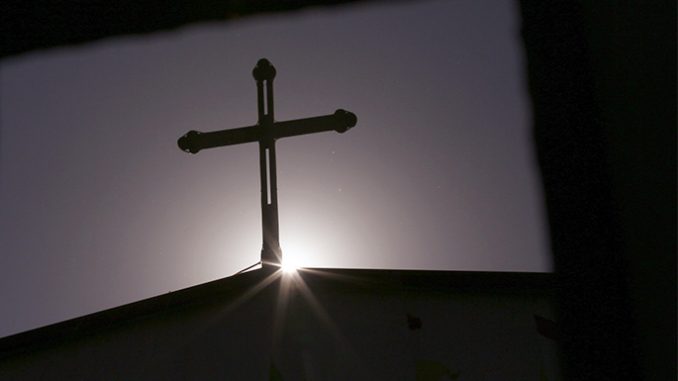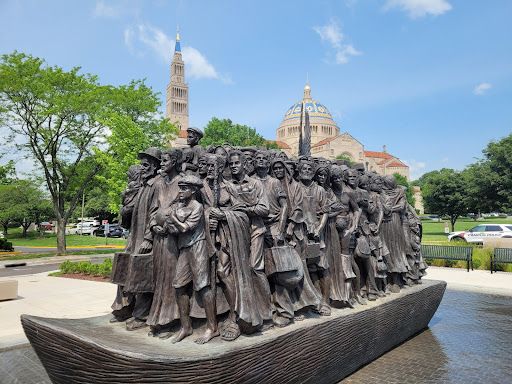
Washington, D.C. Newsroom, Aug 21, 2023 / 13:15 pm (CNA).
The chairman of the House Select Committee on the Chinese Communist Party warned on Thursday of efforts from the Chinese government to subvert Christianity by changing parts of the Bible.
“The Chinese Communist Party is rewriting the Bible,” Rep. Mike Gallagher, R-Wisconsin, said in a pre-recorded message to the biannual gathering of the Parliament of the World’s Religions in Chicago held Aug. 14 through Aug. 18.
Gallagher discussed two examples in which the Chinese government has rewritten parts of the Bible and taught it as fact. In one example, he noted a misrepresentation of the account in the Gospel of John in which Christ says, “Let he among you without sin cast the first stone” when a woman is accused of adultery.
“It’s a beautiful story of forgiveness and mercy — unless, of course, you’re a CCP official,” Gallagher said. “Then it’s a story of a dissident challenging the authority of the state. A possible sneak preview of what a Bible with socialist characteristics might look like appeared in a Chinese university textbook in 2020. The rewritten Gospel of John excerpt ends not with mercy but with Jesus himself stoning the adulterous woman to death.”
As the Union of Catholic Asian News reported in September 2020, a textbook published by the CCP-run University of Electronic Science and Technology Press falsely asserted that the story ends with Christ stoning the woman to death, declaring himself to be a sinner and saying “if the law could only be executed by men without blemish, the law would be dead.”
In another example, Gallagher said that local CCP officials in the Henan province of China forced churches to replace displays of the Ten Commandments with quotes from President Xi Jinping.
“Quotes like ‘thou shalt have no other gods before me,’ became diktats like ‘resolutely guard against the infiltration of Western ideology,’” Gallagher noted. “… Xi Jinping has no problem with the First Commandment just so long as he and the CCP are playing the role of God.”
The Holy See entered into a two-year provisional deal with China in 2018, which was renewed in 2020 and 2022. However, some Vatican officials have warned that the deal does not ensure enough religious freedoms for Catholics. In April, a bishop was appointed to Shanghai without Vatican approval, but Pope Francis eventually approved the appointment in July.
Gallagher noted that the CCP only legally recognizes five faiths but that less established religions face even more persecution than the legally recognized ones. For example, he noted that “at times, half of the population of China’s reeducation through labor camps, or modern gulags, were Falun Gong adherents, and thousands were reportedly tortured to death.” He also referenced the persecution of “Buddhists and Muslims in the far west of the country [who] are facing, quite simply, the attempted annihilation of their faith and in some cases their population.”
Despite the persecution of religious groups in China, Gallagher also noted that faith still persists in China.
“I’ve heard unthinkable stories of religious persecution,” Gallagher said. “But I’ve also listened to accounts of underground churches, brave clergy, and steadfast believers every bit as courageous as saints of the early Church.”
If you value the news and views Catholic World Report provides, please consider donating to support our efforts. Your contribution will help us continue to make CWR available to all readers worldwide for free, without a subscription. Thank you for your generosity!
Click here for more information on donating to CWR. Click here to sign up for our newsletter.






During “McCarrick Con II” Bergoglio pledged “Zero Tolerance” and “annual reports.” Five years later the former has indeed been implemented, but only against Catholics attending Traditional Latin Mass – as is the case for the majority of the 12 million underground Catholics in Nazi-China. The latter was appatently a big fat lie: not one annual clean up report has been published by the Vatican in over 5 years.
The question Catholics should be asking is Was “Traditionis Custodes” not a nod and a wink to Xi-Jingping, part of the China Deal?
McCarrick negotiated over years a seeming franchise during which he was (widely affirmed in Rome) filmed in CCP Hotel rooms with underage boys.
This McCarrick-Paolin CCP “Franchise” (Bergoglio prefers to publicly refer to it as ‘Deal’) reportedly allows for a CCP Novos Ordo rewrite of scripture. The hotel room negotiations- part of the McCarrick Legacy protected by Bergoglio – was signed rapidly by the Argentinian. PpBXVI fatally refused to sign it in 2012.
China “Franchise” Deal and Traditionis Custodes: just part of the McCarrick Legacy consciously enshrined in the Post-“Post-Conciliarism” that is “New Synodal Bergoglioism” which will be remembered for the “Zero Tolerance” only towards Faithful Catholics who sin against Climate Change, Agenda 2030 by remaining rigidly attached to Catholicism, the 10 commandments, Natural Law… The sins against “The Spirit of Francis.”
The communists regimes having rejected the revealed law of Scripture would have no issue to rewrite parts or all of Scripture to reflect the, the progressive socialist ideologies in their attempt to dismiss God from the public square. Lets us not forget the cornerstone of communism is atheism classic or new. Years ago there were allegations that China would rewrite the Bible to reflect a Confucian world view obviously subordinate to the state. China simply endorses modernized liberation theology to promote liberation from God.
Rewriting scripture passages seems a worse offense than eliminating them altogether like Thomas Jefferson did but I think the efforts come from the same sort of incentive. It’s ideological editing of commission vs omission.
Do we have the courage of these persecuted martyrs? I think we are about to find out.
Quick learners! “Pope” Xi and friends are already correcting Scripture like the German Synodalweg! It took a decade of synodaling in Rome to finally get the Dicastery for the Doctrine of Fernandez. Arius convinced Emperor Constantine to call Synods. Why shouldn’t our dear leader Xi follow up this October with the new paradigm Synod II, Shanghai! Xi can appoint Archbishop Bin a Cardinal to host the papal guests. Everyone can get a welcome package: a little red book with Synodaling instructions, a spyware kit, a Winnie the Pooh Xi sqishmallow, etc. When we break from Synodaling, there can be feasting and games, like taking turns stoning those annoying, rigid, backwardist, stucked underground people.
Ah, Synodaling is so satisfying!
So, is Pope Francis still in ‘Full Communion’ with Catholic Church leaders President Xi Jinping and the Chinese Communist Party?
The Pope’s deal with the devil in china one of the least intelligent decisions for the church EVER. They are rewriting the BIBLE and he is ok with that?? How does he claim to be the primary defender of the faith?? Its probably time for him the step down.